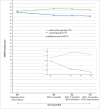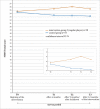The Effectiveness of a Serious Game (MemoreBox) for Cognitive Functioning Among Seniors in Care Facilities: Field Study
- PMID: 35172959
- PMCID: PMC9015760
- DOI: 10.2196/33169
The Effectiveness of a Serious Game (MemoreBox) for Cognitive Functioning Among Seniors in Care Facilities: Field Study
Abstract
Background: Serious games have been found to have enhancing and preventative effects on cognitive abilities in healthy older adults. Yet, there are few results on the effects in older seniors with age-related low cognitive impairments. Their special needs were considered when designing and using innovate technology in the area of prevention, which is especially relevant owing to the continuously aging population.
Objective: The objective of this study was to evaluate the impact of a serious game on the cognitive abilities of seniors in order to potentially implement innovative resource-oriented technological interventions that can help to meet future challenges.
Methods: In this controlled trial, we tested the serious game MemoreBox, which features modules specifically designed for seniors in nursing homes. Over a period of 1 year, we tested the cognitive abilities of 1000 seniors at 4 time points using the Mini-Mental Status Test. Only half of the participating seniors engaged with the serious game.
Results: The study included an intervention group (n=56) and a control group (did not play; n=55). Based on the in-game data collection, a second intervention group (n=38) was identified within the original intervention group, which exactly followed the planned protocol. There were no noteworthy differences between the demographic and main variables of the overall sample. The large reduction in the sample size was due to the effects of the COVID-19 pandemic (drop-out rate: 88.9%). The CI was set at 5%. Mixed analysis of variance (ANOVA) between the cognitive abilities of the intervention and control groups did not show a statistically significant difference between time and group (F2.710,295.379=1.942; P=.13; partial η²=0.018). We noted approximately the same findings for mixed ANOVA between the cognitive abilities of the second intervention and control groups (F3,273=2.574; P=.054; partial η²=0.028). However, we did observe clear tendencies and a statistically significant difference between the 2 groups after 9 months of the intervention (t88.1=-2.394; P=.02).
Conclusions: The results of this study show similarities with the current research situation. Moreover, the data indicate that the intervention can have an effect on the cognitive abilities of seniors, provided that they regularly play the serious game of MemoreBox. The small sample size means that the tendency toward improvement cannot be proven as statistically significant. However, the tendency shown warrants further research. Establishing an effective prevention tool as part of standard care in nursing homes by means of an easy-to-use serious game would be a considerable contribution to the weakened health care system in Germany as it would offer a means of activating senior citizens in partially and fully inpatient care facilities.
Trial registration: German Clinical Trials Register DRKS00016633; https://tinyurl.com/2e4765nj.
Keywords: aging; care facilities; cognitive function; cognitive impairments; health technology; mental health; seniors; serious game.
©Jana Marina Kleschnitzki, Luzi Beyer, Reinhard Beyer, Inga Großmann. Originally published in JMIR Serious Games (https://games.jmir.org), 01.04.2022.
Conflict of interest statement
Conflicts of Interest: None declared.
Figures




Similar articles
-
Modification in the Motor Skills of Seniors in Care Homes Using Serious Games and the Impact of COVID-19: Field Study.JMIR Serious Games. 2022 May 10;10(2):e36768. doi: 10.2196/36768. JMIR Serious Games. 2022. PMID: 35536610 Free PMC article.
-
Prevention of falls and fall-related injuries in community-dwelling seniors: an evidence-based analysis.Ont Health Technol Assess Ser. 2008;8(2):1-78. Epub 2008 Oct 1. Ont Health Technol Assess Ser. 2008. PMID: 23074507 Free PMC article.
-
The future of Cochrane Neonatal.Early Hum Dev. 2020 Nov;150:105191. doi: 10.1016/j.earlhumdev.2020.105191. Epub 2020 Sep 12. Early Hum Dev. 2020. PMID: 33036834
-
Effectiveness of Serious Games for Visuospatial Abilities in Elderly Population with Cognitive Impairment: A Systematic Review and Meta-Analysis.Stud Health Technol Inform. 2022 Jun 29;295:112-115. doi: 10.3233/SHTI220673. Stud Health Technol Inform. 2022. PMID: 35773819
-
Systematic reviews of the effectiveness of day care for people with severe mental disorders: (1) acute day hospital versus admission; (2) vocational rehabilitation; (3) day hospital versus outpatient care.Health Technol Assess. 2001;5(21):1-75. doi: 10.3310/hta5210. Health Technol Assess. 2001. PMID: 11532238 Review.
Cited by
-
Modification in the Motor Skills of Seniors in Care Homes Using Serious Games and the Impact of COVID-19: Field Study.JMIR Serious Games. 2022 May 10;10(2):e36768. doi: 10.2196/36768. JMIR Serious Games. 2022. PMID: 35536610 Free PMC article.
-
Effect of digital game intervention on cognitive functions in older adults: a multiple baseline single case experimental design study.BMC Geriatr. 2024 May 8;24(1):410. doi: 10.1186/s12877-024-05011-3. BMC Geriatr. 2024. PMID: 38720259 Free PMC article.
-
The light side of gaming: creativity and brain plasticity.Front Hum Neurosci. 2024 Jan 5;17:1280989. doi: 10.3389/fnhum.2023.1280989. eCollection 2023. Front Hum Neurosci. 2024. PMID: 38249576 Free PMC article.
-
Effects of Electronic Serious Games on Older Adults With Alzheimer's Disease and Mild Cognitive Impairment: Systematic Review With Meta-Analysis of Randomized Controlled Trials.JMIR Serious Games. 2024 Jul 31;12:e55785. doi: 10.2196/55785. JMIR Serious Games. 2024. PMID: 39083796 Free PMC article. Review.
-
The effect of recreational games on happiness, life satisfaction, loneliness, and somatisation in elderly individuals: a non-randomized controlled trial.BMC Psychol. 2025 Mar 22;13(1):289. doi: 10.1186/s40359-025-02583-6. BMC Psychol. 2025. PMID: 40121499 Free PMC article. Clinical Trial.
References
-
- Brown GC. Living too long: the current focus of medical research on increasing the quantity, rather than the quality, of life is damaging our health and harming the economy. EMBO Rep. 2015 Feb 18;16(2):137–41. doi: 10.15252/embr.201439518. doi: 10.15252/embr.201439518.embr.201439518 - DOI - DOI - PMC - PubMed
-
- Ageing characterises the demographic perspectives of the European societies - Issue number 72/2008. European Commission. 2008. [2022-03-12]. https://ec.europa.eu/eurostat/web/products-statistics-in-focus/-/KS-SF-0... .
-
- Fisk A, Rogers W. Handbook of Human Factors and the Older Adult. Cambridge, MA: Academic Press; 1997.
LinkOut - more resources
Full Text Sources
Miscellaneous

